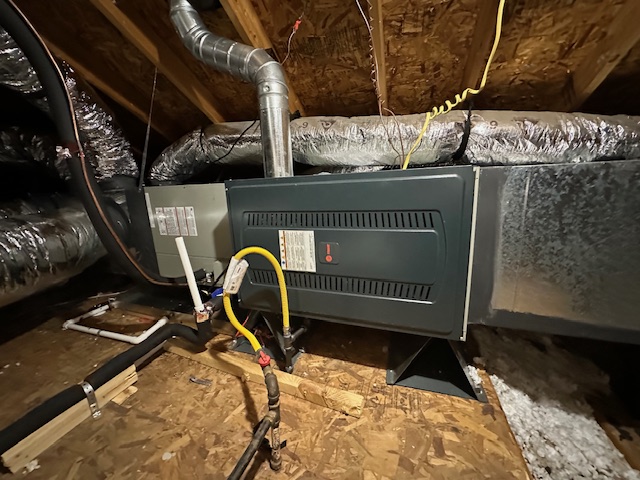An AC tune-up before the hot weather hits is one of the smartest moves you can make for your home comfort and wallet. Regular AC maintenance can prevent up to 85% of emergency breakdowns by identifying and fixing small issues before they become major problems.
Homeowners who skip their annual AC tune-ups often end up calling for emergency repairs on the hottest days when their systems are under the most stress. These preventable breakdowns not only leave families uncomfortable but also typically cost significantly more than routine maintenance. A professional tune-up ensures your system runs efficiently, extends equipment life, and helps avoid those inconvenient and expensive emergency service calls.
How an AC Tune-Up Prevents Emergency Repairs
Regular AC tune-ups are your best defense against unexpected breakdowns during hot summer days. These preventative services help identify potential issues before they lead to system failures and costly emergency repairs.
The Importance of Preventive Maintenance
AC tune-ups involve comprehensive system checks that keep your cooling system running smoothly. During these visits, HVAC technicians inspect all components of your air conditioner for signs of wear or damage. They clean critical parts, check refrigerant levels, and ensure proper operation of electrical connections.
Regular maintenance also improves energy efficiency. When your AC runs efficiently, it uses less power and experiences less strain. This reduction in stress helps prevent overheating and system failures during peak summer temperatures. Schedule AC maintenance at least once per year, ideally in spring before the cooling season begins. This timing allows technicians to address any issues before you need to rely heavily on your system.
Addressing Common Issues Before They Worsen
During an AC tune-up, technicians can spot minor problems that could develop into major breakdowns. For example, they might notice worn fan belts, dirty coils, or refrigerant leaks – all issues that can be fixed quickly during maintenance. Experts often find electrical issues during tune-ups that could become fire hazards or cause system shutdowns if left unaddressed.
Without regular checks, these small problems often go unnoticed until they cause complete system failure or worse. A refrigerant leak might start small but eventually lead to compressor damage, which is one of the most expensive AC repairs.
Meanwhile, DIY AC maintenance includes cleaning or replacing air filters. Clogged filters restrict airflow, forcing your system to work harder and potentially overheat. This simple maintenance task can prevent numerous AC emergencies.
Extending the Life of Your AC System
Regular AC tune-ups significantly extend the lifespan of your cooling system. Most air conditioners should last 10-15 years, but without proper maintenance, many fail prematurely. Technicians lubricate moving parts to reduce friction and wear, and clean condenser coils to improve heat transfer and system efficiency. These services minimize stress on critical components like the compressor and fan motors.
AC tune-ups also include calibrating your thermostat for optimal performance. An accurately calibrated thermostat prevents your system from short-cycling or running longer than necessary. The cost of annual maintenance is much lower than emergency AC repair or early system replacement. Most HVAC companies offer maintenance plans that include priority service and discounts on repairs when needed.
Key Components Checked During an AC Tune-Up
A professional AC tune-up includes a thorough inspection and servicing of several critical components that keep your system running efficiently.
Filter Replacement and Cleaning
Dirty or clogged filters are one of the most common causes of AC inefficiency and breakdown. During a tune-up, technicians thoroughly inspect your air filters to determine if they need cleaning or replacement.
A clogged filter restricts airflow, forcing your system to work harder and consume more energy. This extra strain can lead to overheating and premature component failure. Replace disposable filters every 1-3 months, depending on usage and environmental factors. Homes with pets or allergies may require more frequent changes. Some systems also use washable filters that need regular cleaning. Our technicians will show you how to properly maintain these between service visits.
Warning signs of a dirty filter:
- Reduced airflow from vents
- Higher energy bills
- More dust in your home
- The system is running longer than usual
Checking Refrigerant Levels
Refrigerant absorbs heat from inside your home and releases it outside, and the correct refrigerant levels are crucial for efficient operation. During a tune-up, HVAC experts check refrigerant pressure to ensure it meets manufacturer specifications. Low refrigerant levels usually indicate a leak that needs immediate attention.
Signs of low refrigerant include:
- Weak cooling performance
- Ice formation on the evaporator coil
- Hissing sounds near the unit
- Higher electric bills
If a refrigerant leak is discovered, the technician will locate and repair it before recharging the system. This prevents further refrigerant loss and protects the environment. Refrigerant checks are technical procedures that require special tools and certification. Never attempt to add refrigerant yourself, as improper handling can damage your system and violate environmental regulations.
Thermostat Calibration and Inspection
Your thermostat serves as the control center for your entire HVAC system. Even minor calibration issues can lead to comfort problems and wasted energy.
During a tune-up, a professional will verify that your thermostat readings match actual room temperatures. A properly calibrated thermostat ensures your system runs only when needed. They’ll also check electrical connections and battery status, if applicable. Loose wiring can cause erratic operation or complete system failure.
For programmable thermostats, they can review your settings to maximize efficiency. Smart thermostats may need software updates or connectivity checks during maintenance visits. These advanced controls often provide diagnostic information that helps to identify potential system issues.
Detecting Leaks and Blockages
A comprehensive tune-up includes checks for several common problems. Professionals inspect condensate drain lines for clogs that could cause water damage or trigger safety switches that shut down your system. Algae and mold frequently grow in these damp areas. Ductwork also receives attention during inspections, as leaky ducts can waste up to 30% of your cooled air before it reaches living spaces.
Technicians also check for:
- Water leaks around the indoor unit
- Air leaks in accessible ductwork
- Restrictions in return air pathways
- Blockages around the outdoor condenser
Benefits of Regular AC Tune-Ups in Summer
Preventative care protects your system while improving your comfort and reducing costs throughout the summer months.
Reducing the Risk of Emergency Repairs
AC tune-ups significantly decrease the likelihood of unexpected breakdowns during peak summer heat. When technicians inspect your system, they can identify worn components, loose connections, and potential failure points before they cause complete system failure.
Many emergency repairs stem from small issues that grow into major problems. For example, a slightly loose electrical connection might eventually lead to a compressor failure if not addressed early. Homeowners who schedule consistent tune-ups experience 85% fewer emergency service calls during summer months. This preventative approach not only saves money but also prevents the discomfort of being without cooling during the hottest days.
Boosting Energy Efficiency and Lowering Costs
A well-maintained air conditioner operates more efficiently, consuming less electricity while delivering optimal cooling. During tune-ups, technicians clean vital components like condenser coils that directly impact efficiency. The financial benefits are substantial. Most homeowners see a 15-20% reduction in cooling costs after a professional tune-up. These savings typically offset the maintenance cost within 2-3 months of summer operation.
Improving Cooling Efficiency and Indoor Air Quality
Technicians clean or replace air filters during maintenance visits, removing accumulated dust and allergens. Clean filters allow proper airflow through your system, maintaining cooling capacity and distributing air effectively throughout your home. Restricted airflow from dirty filters can reduce cooling efficiency by up to 15%. Proper maintenance often resolves common complaints like uneven cooling or stuffy rooms.
Beyond temperature control, your AC system plays a crucial role in filtering indoor air. Professional maintenance includes cleaning drainage systems and checking for moisture issues that could lead to mold growth. Many homeowners notice improved breathing comfort after a thorough AC tune-up, especially those with allergies or respiratory conditions.
Early Troubleshooting of Unusual Noises or Signs
Strange noises from your AC often signal developing problems that can be addressed during routine maintenance. Grinding sounds may indicate bearing issues, while banging might reveal loose components. Technicians listen for these warning signs and investigate their causes. Many repairs caught at this stage are simple and affordable compared to addressing the same issues after component failure.
Unusual odors, water leaks, or inconsistent cooling are also indicators that technicians evaluate during maintenance visits. These symptoms often point to specific issues that can be resolved before they escalate. It’s a good idea to keep notes about any unusual system behavior to share with your technician. This information helps target problem areas during the tune-up process and ensures more thorough maintenance.
Regular system checks create a maintenance history that helps technicians spot patterns and predict potential future issues based on your specific equipment's performance over time.
Choosing the Right AC Service Provider
Selecting a reliable AC service provider is essential for effective maintenance and preventing costly emergency repairs.
Finding Qualified HVAC Technicians
When searching for local AC repair, start by reading customer reviews of local companies. These reviews offer real insights into service quality and reliability. Ask friends and neighbors for recommendations, as personal experiences often reveal trustworthy HVAC technicians. Always look for proper licensing and certifications. Qualified technicians should have NATE certification or similar credentials that demonstrate their expertise.
Experience matters in HVAC repair, and companies with many years in the business typically have encountered and solved a wide range of air conditioning problems. Also, check if they offer emergency services. The best AC service providers offer 24/7 support for when your system fails during a heatwave.
Key AC Service Checklist for Homeowners
Before hiring an HVAC company, verify that they provide detailed written estimates, which should include labor costs, parts, and the expected timeline for completion. Ask about their preventative maintenance packages and consider the range of services offered. A good provider handles everything from routine maintenance to complex repairs and full system replacements.
Essential service qualities to verify:
- Transparent pricing without hidden fees
- Warranties on both parts and labor
- Clean, professional appearance and equipment
- Clear communication about what work needs to be done
Get in touch to arrange an AC tune-up or to discuss our maintenance plans.











